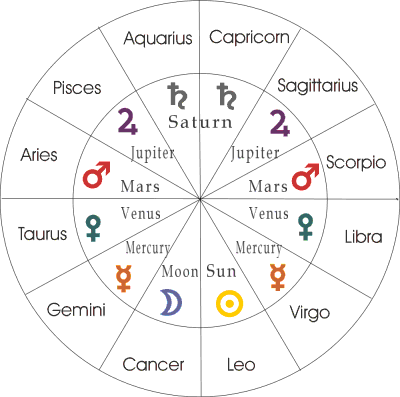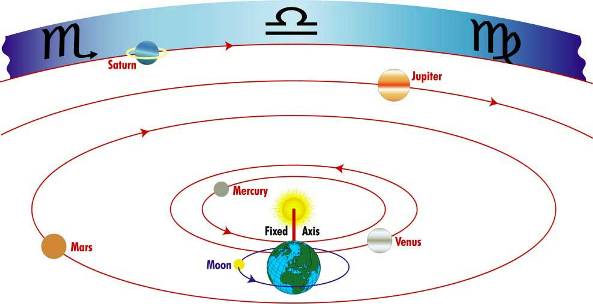So far we have talked about aspects and meaning of houses in horoscope as areas and performance field. I intend to present some basic things before entering into details.
I will once again return to the basic principle connected with the analysis of planets:
The “tasks” of each planet are defined on the base of the following factors:
• which houses in the horoscope this planet rules
• in which house it is positioned
• which houses it “looks at” and is “willing” to intervene in their acts. This is done primarily through the aspects of the planet.
All the information on aspects and houses should be integrated and synthesized within this basic principle.
One of the factors that I did not present in detail, is ruling houses in horoscope. What is it and how to understand it? The principle is very easy. Each zodiacal sign is ruled by a planet. Planets that were visible and that were taken into account in ancient times were 7 in number - Sun, Moon, Mercury, Venus, Mars, Jupiter and Saturn. The ruling of signs was originally allocated between them. Later, the ruling scheme included Uranus, Neptune and Pluto. I will not explain whether these three planets should be included in this scheme or not and how to get involved. Once you get to know signs allocation and ruling, you can assess whether and how to take them into consideration.
I will present the classic scheme.
What does it mean that a planet rules a zodiac sign?
Each sign (and house, respectively) is a non-living area. They are immobile cuts of the celestial sphere. Planets are those that bring life to them. Imagine signs are houses and planets are the people that live in them and possess them. As each house has an owner, the person at whose disposal it is, who uses it, so any zodiacal house is ruled by a planet. But everyone should pay their taxes on that property, we should not forget it though. Like any other thing, the state of the house depends primarily on its owner – how the owner takes care of it. That is the most important thing in the whole picture.
For example, there is a fifth house in any horoscope, which defines human offspring. The ruling planet (and the planets that “rents” the fifth house) defines how active this area will be in life. Saturn, for example, is a restricting planet, separating, dry and infertile in nature. But if it rules the fifth house, its low fertility is modified - its task is to take care of the offspring, to bring creative energy in man. It is true that this will go along with some delay, difficulties, fear, feelings of insecurity or a source of security. But it is still the planet that has this task – how it will implement it and how keen it will be is something else and a subject of another topic.
The next picture shows how the ruling of signs is allocated between the planets:

As not shown in the picture, I would add that modern Western astrology gives the ruling of Scorpio to Pluto, of Aquarius to Uranus and of Pisces to Neptune.
The signs Cancer and Leo are referred to as central and therefore the Moon and the Sun rule (possess) them. Summer and winter solstice occur respectively in the signs of Cancer and Capricorn. It appears then as if the sun stops for a while and goes in the opposite direction. During the solstice, it turns its course (the visible one) from north to south or vice versa.
The ruling of the other signs is in accordance with the orbits of the planets around the Sun. Like this:

As you can see, next to the Sun is Mercury's orbit. In this way Mercury takes the rule of the signs Virgo and Gemini that are near Cancer and Leo respectively. The next signs - Taurus and Libra - are ruled by Venus, which is the second in distance. The signs Aries and Scorpio are ruled by Mars - the third planet. Pisces and Sagittarius – by Jupiter - the fourth one. And Aquarius and Capricorn - by Saturn – the most distant planet.
Each sign represents one half of the orbit of the planet. Thus Gemini is associated with the one half of the orbit of Mercury – the positive and Virgo - with the other negative half. It is similar with the other planets. This division in positive and negative part is resulting from the division in even and odd signs. The even ones associate with the female, passive and negative energy, which is absorbing. And the odd ones - with male, positive energy, which is active and directed outwards. The negative part of the orbit represents the place where the planet merges with the cosmic energy, while the positive part represents the place where the planet frees, separates itself of it.
The ruling of houses is allocated on the base of the same principle - depending on the sign into which a house falls it is ruled by the planet ruling this sign. For example, if the Ascendant falls in the Virgo, the planet ruling the first house (or Ascendant) is ruled by Mercury. It follows that Mercury is the planet in charge of the acts of the first house.
I have already written that planets are divided into beneficial and maleficent (see article “Elements of the horoscope - Part 3. Aspects between planets - how to analyze them). This, however, is combined with the ruling of houses to categorize whether a planet will act as maleficent, beneficial or neutral in this horoscope. The ruling of houses is actually one of the most important moments when it is determined what will be the imapct of a planet. Because its nature is modified depending on the area it is focused upon.
The ruling planet has to take care of the acts of its house/houses. One planet can do good things in a horoscope and bad things in another horoscope. But there are no good and bad planets. As I mentioned still in the division by nature in beneficial and maleficent, such definitions of the planets are completely CONDITIONAL.
The use of these two categories - good and evil – always raises the question: “What is it good for and what is it bad for?” One planet is not just “evil and destructive”. It is the way it is for a specific thing. It has the obligation to destroy something. The same goes for “goodness”. To what and whom it is directed? The houses that the planet rules and the house where it is positioned determine this last thing.
As life does not always run on wheels, it is perfectly normal if Jupiter, which is the biggest beneficial planet by nature, rules one of the suffering houses in horoscope, like the eighth house, to cause events in the life of the eighth home. Namely crisis, deprivation of life force, sharp turns, accidents, death. Which can hardly be called beneficial. Of course, there are beneficial twists in life. A crisis does not always bear negativity - it's just taking a new direction. Sometimes desirable, sometimes not.
Following this logic, each planet temporarily becomes beneficial, maleficent or neutral depending on the houses in horoscope which it rules. Every house outlines specific area and this leads to different motivation in rulers. Similarly, when you go out with friends, your motivation is to have fun. Not to concentrate, work, fight, etc.
To summarize, the ruling of houses gives different meaning to the planets in each horoscope. Here I will mention that the Indian Astrology uses the Sanskrit term for Ascendant – lagna.
(I would like to add that the Sanskrit terminology that Indian astrology has kept is a real wealth and it is indispensable if you are to understand the essence of all elements in the horoscope and astrology in general; terminology of the Western astrology is not so penetrating - perhaps as a result of the numerous translations and adjustments made).
So, what does “Lagna” means? It means to be bound by certain conditions and obligations, to be connected. Lagna/the Ascendant bounds the planets in a specific horoscope by certain obligations according to their position in the time and place of birth. In other words, each planet is "obliged" to perform a specific job, be responsible for something, it associates with a certain rhythm at the time of birth.
Every Ascendant and the order of the houses to it, having in mind the above, have their own "rules" which define the planets functioning Therefore, by defining the houses which a planet rules we define the temporary status of this planet in the specific horoscope, we define the rules it functions in accordance with.
Of course, the nature of planets remains, but the temporaryl status of the planet modifies it.
Next: How the planets act while ruling different houses.